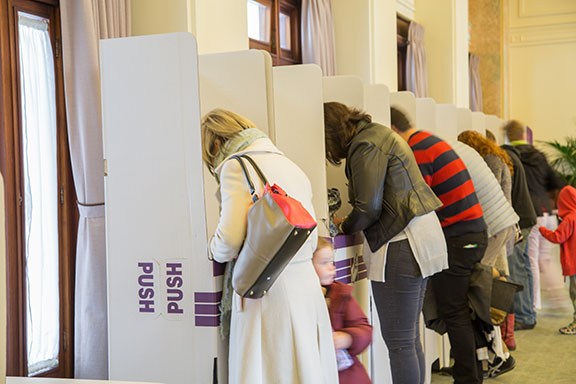As a pastor, I often get different questions: “How do I know God’s will for my life?” “Why did God do that in the Bible?” “Can you teach me to pray?” In this election cycle, however, one question crystallizes for Christians: “How do I know who to vote for?”
Do we vote to protect our values?
Now, here’s the typical answer to that question. Usually, we say we should vote in a way that allows a particular political party or leader to protect our values. And this is good because it encourages Christians to vote with integrity within our worldview. However, it also has some problems. The first point is that no party perfectly upholds every Christian value. Some parties care about the climate (a Christian ideal) while being relativistic about moral issues (something Christians are more nervous about). Other parties do exactly the opposite. This almost always means that you cannot “vote in a Christian way” unless you elevate one value over the other and cultivate an overbearing piety that works itself out in the judgment of other Christians. Very unhappy.
Why it’s more than ‘just a voice.’
However, the second problem is much bigger. In Australia, you could say we are culturally secular. Secularism holds that one’s beliefs are private and not public and that the goal of a democratic government is to maintain the social contract in which all citizens buy. Therefore, individual citizens participate in politics within a democracy by electing officials to represent their values. While this is good, especially given the mishmash of our population’s values, there is a cost involved. And the prize, for Christians, is that we can reduce what we mean by “politics” to a simple “vote according to our personal values”.
Sure, Australia’s liberal democracy makes voting meaningful. However, the secular narrative of the world has led modern Christians to believe that our beliefs and behavior are private and non-political. And once we buy that idea, it’s a quick jump to think we can only “vote.”
Where imperial policies supported unjust social norms, Christians sought to provide just solutions.
However, the New Testament image – and the story of the early church – challenges this domestication of the church. Early Christians lived a life of radical obedience to Jesus as King under violent imperialism. This did not mean their trigger-happy disobedience to the state; it entailed their critical reflection and wise action as they sought to be ambassadors for King Jesus in a world that adored Caesar. Where imperial policies supported unjust social norms, Christians sought to provide just solutions. They saw their behavior as political. Why? Because they saw it as the outworking of the ethos of the kingdom of God, modeled in Jesus.
Being political is more than just politics.
The story of secularism leaves unspoken the provocative way our behavior is political. If you think about it on a local and community level, how we behave has tremendous power to shape our world. Instead of thinking that casting a vote is all we can do, Christians should be people who think their voice is the least they can do. In ancient Rome, for example, infanticide was a common practice supported by the state. Thus, the early Christians would take care of unwanted babies thrown away by unwilling or possibly poor, overburdened parents struggling to feed the children they already had. Early Christians used their lives to vote for the world God desires in a world without a voice. They embodied the answer their government would not give.
We can still do the same in a safe, liberal democracy where we get a voice. Let me put it this way: Do you find it difficult to pick a side to vote for because they disagree with that Christian ideal? In the community, the model is the plan that your voice cannot achieve. In other words, Christians have every reason to seek local solutions to bigger problems; they bless their neighborhood with their deeds. Certainly, we will not usher in the kingdom of God through human effort any more than we can bring about the Second Coming. No, what we do when we do this is simply fulfilling our call as disciples: follow Jesus. It is a faithful participation in what Jesus has modeled and an anticipation of what Jesus promises: a new world of love, joy, peace, and justice. It is the kingdom of God.
Investigate, think, and pray for wisdom.
Now we can certainly do more with our voice. As Christians living in a watching world, we could vote not for ourselves but for our neighbors. So often, we raise our own needs at election time, especially regarding economic and occupational conditions. But what if Christians voted in a way that would benefit not ourselves but our neighbors or the marginalized? This would determine voting around others, not ourselves. Of course, we need wisdom here; it’s not about voting for the party your neighbor wants to win. It’s about pausing long enough to notice the real need in our communities and caring enough that you vote to address it. This kind of philosophy can even lead us to vote for a party that we would otherwise have ignored because it is inconsistent with a particular moral issue.
Voting is important. We need to think seriously – and yes, pray. But never with fear. But as followers of the risen Lord Jesus, we know that our opportunity to witness politically in this country far outweighs our voice.
So be wise this election year when you vote with your ballot. But at the same time, be an ambassador for the kingdom of God and vote with your life.
Alex Stark is the Lead Pastor at Newlife Church Brisbane
